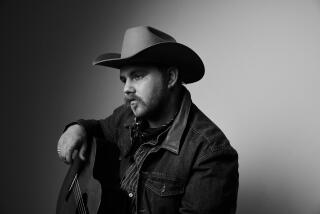A HORN ALBUM--AT LAST
Note: All records reviewed here are CDs unless otherwise identified. If any cuts are not included in the LP versions, it will be so noted.
“I THOUGHT ABOUT YOU.” Shirley Horn Live at Vine Street (Verve 833-235-2). At last, the great lady from D.C. has her own CD--in fact, her first major-label album in 20 years, thanks to record producers who can’t see beyond their cash registers. It is ironic that after all those years based in Washington (and after numerous appearances in New York) she had to go to Hollywood to land this superlative live date.
Not since Nat King Cole has such an exemplary pianist become a singer of commensurate talent. The lyrics and music are often understated and never over-arranged (backing consists simply of her regular bassist and drummer, Charles Ables and Steve Williams). Her sound is gentle and all but effortless, her mix of vocal and pianistic artistry infallible.
Several tunes are familiar without having been overworked: “Something Happens to Me” and “The Eagle and Me.” The Italian song “Estate” (Summer) is almost a recitative, with English lyrics by Joel Siegel, who wrote the literate liner notes. “I Got It Bad” includes some seldom-heard extra lyrics.
At the piano, Horn is an ideal self-accompanist and a distinctive soloist. “Isn’t It Romantic” is an instrumental track. (The CD includes an extra instrumental, the extended version of “Quiet Nights,” and an additional vocal, “I Wish I Didn’t Love You So.”)
Shirley Horn need no longer be called a cult artist or a legend. Without question she is the singer of the year, and arguably the pianist too. 5 stars.
“BRAZILIAN ROMANCE.” Sarah Vaughan. CBS ZK 42519. The three key figures are Vaughan, who is in glorious voice throughout; Sergio Mendes, who produced the album and revived “So Many Stars,” a radiant song he wrote with the Bergmans; and Dori Caymmi, who composed five of the other songs and is heard prominently on guitar.
Swooping down or soaring up with equal ease, Vaughan retains the inherent beauty of these Brazilian melodies while bringing to them her own immutably wondrous personality. Oddly, in Milton Nascimento’s “Love and Passion” the composer shares the vocal with her, in Portuguese, yet their voices are so similar that you could swear Vaughan was singing bilingually. 5 stars.
“CLARE FISCHER PLAYS BY AND WITH HIMSELF.” Discovery DSDC 934. Playing one or more of three pianos, using speed-up trickery and multitracking, Fischer avoids the impression of gimmickry in this cerebral yet often emotional set. Included are abstract originals, a complex fugue, a moody blues and the occasional standard (Arlen, Evans, a Strayhorn medley and Gerry Mulligan’s “Jeru” in a keyboard transcription of the original Miles Davis version). “Counterall” turns out to be “All the Things You Are” disguised in a contrapuntal mosaic. 4 stars.
“EVERY NIGHT.” Joe Williams Live at Vine Street. Verve 833-236-2. Did he ever let you down? There are several hiddenplus-factors, such as the revised version of “Every Day” (now including Miles Davis’ “All Blues” waltz), Williams’ own title tune and several excellent solos by his sidemen: Henry Johnson, guitar; Bob Badgley, bass, and Gerryck King, drums. The set opens and closes with tributes to Williams’ original idol, Joe Turner (“Shake, Rattle & Roll,” “Roll ‘Em Pete”). Benard Ighner’s “Same Ol’ Story” has a contemporary groove and beat; “Sometimes I’m Happy” is set up with a genial scat chorus. No, he never lets you down. 4 1/2 stars.
“ANY TIME, ANY SEASON,” Sam Most. Innovation JCCD 0012. Playing flute, alto flute and bass flute, Most makes his way through eight true-to-the-melody readings of pop standards, plus the title tune which he co-wrote with producer Fernando Gelbard. The prominent presence of Frank Collett at the piano is of value throughout. Most is hemmed in by the string arrangements overdubbed in England; a freer improvisational showcase would have been welcome but it’s an agreeable collection. 3 stars.
DIANNE REEVES. Blue Note 46906. This primarily pop set offers a Janus-faced look at a woman who once seemed likely to become the next great jazz singer. Thanks to producer George Duke, on the first side we have accessible songs and smart charts, but nothing soul-shaking. Side Two opens with “Never Said” (“Chan’s Song” from “ ‘Round Midnight”), with Herbie Hancock as pianist, composer and arranger, a smooth sound and well-crafted vocal overdubs by Reeves. “Yesterdays” brings in Freddie Hubbard on fluegelhorn, Billy Childs as arranger and pianist, and Stanley Clarke on bass. Reeves is in fine form on “I Got It Bad” until, toward the end, she overacts and overscats and drags the whole thing down. (She should listen to Shirley Horn’s version.) “That’s All” is taken at a double tempo, with fine work by Childs but with a reading by Reeves that is utterly at odds with the intent of this originally lovely ballad. 2 1/2 stars.
“IN THE MOOD.” Sound track: Ralph Burns Big Band. Atlantic 7-81788-2-N. Writing this track did not impose a hardship on Burns, the Woody Herman arranger of the 1940s who became an Emmy and Oscar-winning composer. The tracks that are not taken more or less directly from the old records of “Don’t Be That Way,” “Take the A Train” and the title tune are workmanlike, unoriginal examples of Swing Era writing, with a few good, mostly short solo spots by Abe Most, Bill Watrous, Oscar Brashear and others. “Jack the Wonder Dog,” played by Most on clarinet and Tom Ranier on piano, is unabashedly borrowed from a Benny Goodman-Mel Powell classic version of “The World Is Waiting for the Sunrise.” 2 1/2 stars.
“SWINGIN’ TILL THE GIRLS COME HOME.” Lambert, Hendricks & Bavan. RCA/Bluebird 6282-2-RB. Yolande Bavan, the Sri Lanka-born actress and (secondarily) singer, replaced Annie Ross in this trio in 1962-63 when these live sessions were taped at Basin Street East, the Village Gate and the Newport Festival. Though she was not another Ross (witness the out-of-tune endings on “April in Paris” and “Doodlin’ ”), she did have a sense of the feeling represented by Hendricks’ “lyricizations” of themes from such sources as Basie, Coltrane and Hancock. The ingenious material is inconsistently performed and there’s a glut of scatting, but when Hendricks is front and center, as in “Gimme That Wine” and “Cloudburst,” it’s good fun. A few tunes have solos by Clark Terry, Coleman Hawkins and Thad Jones. 3 stars.
More to Read
The biggest entertainment stories
Get our big stories about Hollywood, film, television, music, arts, culture and more right in your inbox as soon as they publish.
You may occasionally receive promotional content from the Los Angeles Times.






